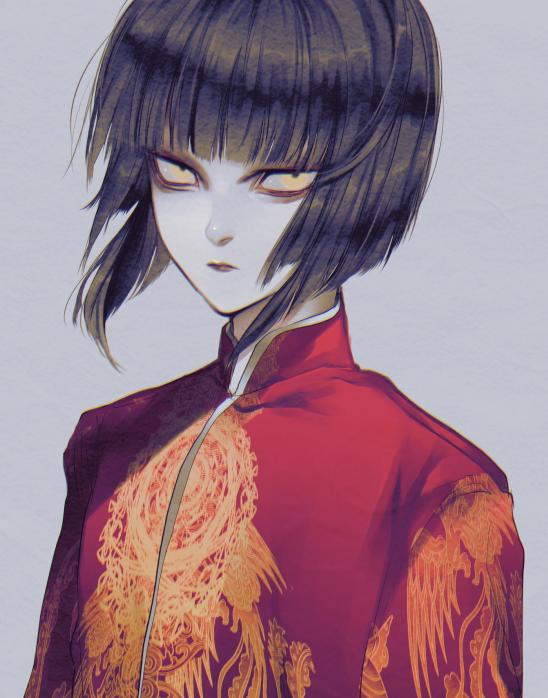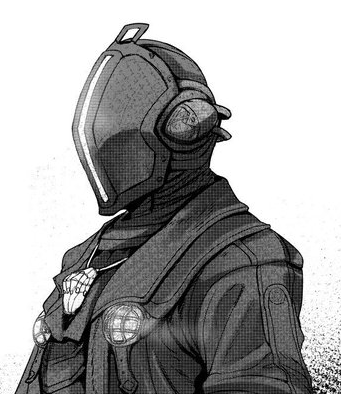
Fuyuki Academy, Banquet of Kings
Caster emerged from the school a respectful step behind his Master, the glow of his mask visible before his body was. Garbed in dark fabrics, dressed more akin to a man of science than a doctor, he stepped out into the night lights of the academy's courtyard. He did not bother to check the sky from which the rain of javelins had poured, nor did he show hesitation in approaching the marshalling group of Servants. With hands behind his, Hippocrates the Second appraised the gathered.
"If I may offer my assessment before anyone partakes of the hunting of Asiatic barbarians," Hippocrates began, his voice cutting through the air with a smooth and calm clarity. "There are greater dangers to your potential victories than one who has been directly impeded this night," he said, eventually coming to a stop not too far from the group of apparent kings. "Dare I say that it is most fortuitous to your individual conditions that you have gathered tonight, and that you are able to hear my message. Otherwise, the likelihood is that you would all be dead in less than a week, no matter your respective strengths."
Caster's voice, for whatever reason, carried a prominence that stopped interruption. He was a man that was meant to be listened to for the sake of ones health, and that was something even the most crazed of Servants could identify from his bearing alone. "Among you, the gathered kings, there is one who can best be described as suffering from a being of 'malignancy'. That is to say, one of you is rotting the Holy Grail War from the inside of the system which constitutes it. By virtue of this individual being summoned, the whole system becomes compromised. Complete failure of the system can be expected within the next few days, discounting any potential for acceleration. Until that point, our bodies will wither. You will grow weak and be brought low, from the immortal memory of a king to a leper among mortal men," the Father of Medicine illustrated.
The neon 'eye' of Caster looked over the gathered individually. Finally, it settled on the one called 'Hercules'.
Not 'Heracles', he noted among many other things.
When Caster regarded the one called Hercules, he could feel his body respond in kind. The near overwhelming desire to cure through direct ministrations manifesting as a roar in his heart, thumping against the cage his mind had constructed for such a rampant desire. The genetic memory of Asclepius within his makeup was almost akin to a living thing in its own right, always demanding immediate and thoughtless action in regards to those who needed his help. The urge, which made up part of Hippocrates' heritage. But much like any instinct, it was base.
It disgusted Hippocrates. Asclepius was but a God of Medicine, lacking in the tact required to truly nuture humanity away from the ailments of the body; Gods were ultimately flawed beings -- powerful, dreadful and beautiful, but too different. Caster's fellow Asclepiad -- his cousins and siblings by distant divinity -- were zealots, too focused on the dying Mystery of their gene-sire rather than adapting to the changes that their era presented.
Caster had adapted. By lowering himself to understanding the ways of the mundane, of explaining things within nature as just that, and appropriately conducting himself as a healer of humanity should, he was remembered by humanity. By humbling himself to the raw fact that change was inevitable, he had usurped his God.
The God was a myth, contributing nothing to mankind's wellbeing. The Physician was true, granting the men of his era and beyond the proverbial fire to continue without the myth. There was yet more work to do, Caster declared to himself in his youth, and that thought carried with him through to his pseudo-immortality.
Humanity was close. The perfection of medicine was but one factor of the future he foresaw in the glint of liquid metal, but it was his duty to see that factor perfected. In his own interest, the source of impending failure had to removed so he could continue.
The man called 'Hercules' was killing the body of the Holy Grail.
"You are the source, hero of a nation. You are the cancerous antithesis of success."
A polite way to not call the man the hero of heroes, whom even a man like Hippocrates could admire.
It was simple pattern recognition, afforded to his eyes to make such a diagnoses of the Servant's circumstances. The man was not Heracles. The son of Zeus would not carry such an obtuse burden upon his body, that which could potentially topple nations through his mere presence. Even at his most subversive, acting as an Assassin, no such ability would manifest within Heracles. It was truly a burden of being which belonged to that of the tyrants of old, specialising in the killing of civilisation rather than something born through the virtuous clash of hero and beast.
The greatest of heroes would not called himself by his Roman name at a first introduction. He may not even proudly introduce himself at all. Indeed, Caster saw before him the equivalent of a man made by Aristophanes; an act, a play -- and In practice -- a fraud. Frauds were dangerous.
Within Caster's body, magecraft was at work. The school of Mysteries formed from the acts and body of Asclepius that of body, and the protection and restoration of it. Although it eluded his children, the theoretical end point of it was true resurrection. That end point was unattainable in the world Hippocrates lived in, and the one he had manifested in. It was that fact which brought Hippocrates to consider the natural world in absence of the divine; if the acts of his gene-sire were not sufficient, then there would be other ways, as it ever was in any field of study.
That was not to say Hippocrates obsessed over learning how to resurrect another -- that was merely one part of a greater whole. He never truly pursued it as a singular act.
But he had pursued the understanding of the forces at play within the body, learning about that which the Mysteries were ignorant. Through his mind, he unified the mundane and the mystical, bringing the Asclepian Mysteries to a precise study. So precise that he scarcely needed more than his own body and a thought to enact a series of small-scale miracles which, when combined, took a greater effect.
A Doctor was always prepared. Within his body, a culture of self-adapted virological cognitive disease developed, travelling in a form of moisture and magical energy. His body felt no effect from them, free from the reason-eroding malady of the short-lived virus, but if he were to bleed, those around him would. It would manifest from him, a 'living humor' as it were.
It was not harmful in a certain sense. Confusing, breaking up ones ability to connect thoughts, disrupting actions with the idea of another action, but it was designed to last no longer than an hour even in absence of his treatment. A simple protective measure, on top of the reinforcement of that which was inside his body.
One breakthrough lead to another. The Father of Medicine was the epitome of synergy in his crafts.
"While I advise that you all turn your eyes to the greater threat, I cannot make you," he said to the gathered kings beside Hercules, revealing his hands slowly to gesture to all of them with open arms. "If you desire evidence, then it will be provided in less than twelve hours."
"And you do, after all, have the 'right' to refuse treatment."


